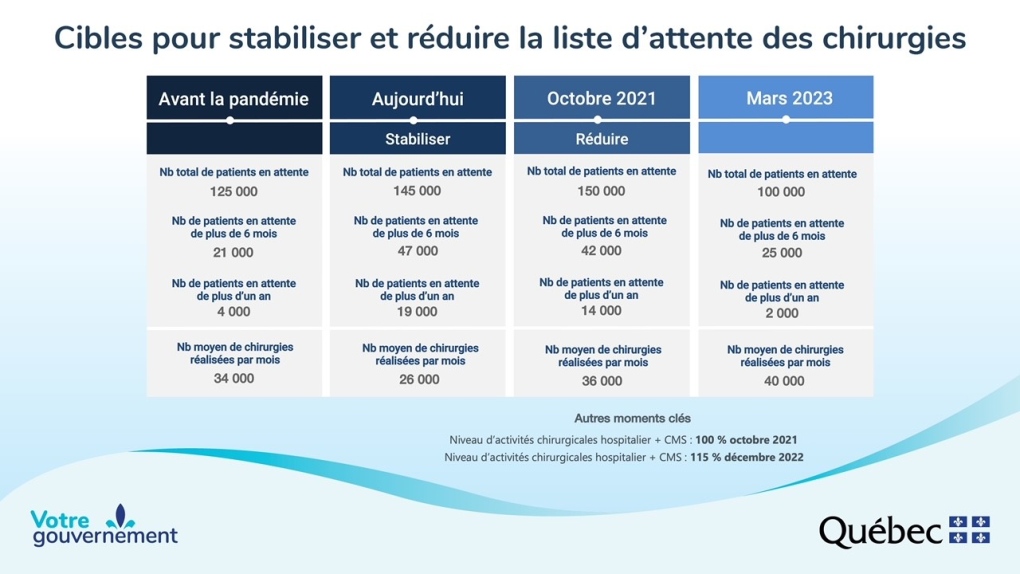As wait list grows, Quebec unveils plan to ramp up non-essential surgeries
Due to the COVID-19 pandemic, a backlog of almost 150,000 Quebecers are waiting for non-essential surgeries, but the government is hoping to reduce that substantially by March 2023.
Under a strategy unveiled on Wednesday, the Quebec Health Ministry revealed it hopes to reduce that number to 100,000, but it could take a while.
The plan would see things get a bit worse before they get better, projecting the wait list would go up to 150,000 from 145,000 by October of this year.
A graphic released by the Health Ministry notes that prior to the pandemic, the wait list was at 125,000 people. Of those, 21,000 had been waiting more than six months and 4,000 for over a year.
In the current day, 47,000 people have been waiting more than six months and 19,000 more than a year. Under the strategy, the government projects those numbers would shrink to 25,000 and 2,000, respectively, by March 2023.
Prior to the pandemic, 34,000 surgeries were being conducted per month. Now, that number has shrunk to 26,000 but the Health Ministry projects a rise to 40,000 per month by March 2023.
Despite COVID-19 cases dramatically shrinking, Health Minister Christian Dube had previously said Quebecers should not expect the healthcare system to catch up on elective surgeries until fall, saying healthcare workers needed a much-deserved break. On Thursday, he reiterated that point, saying the pandemic resulted in Quebec losing "a lot of personnel and we need to get this personnel for the ones that are still there. We need to get them rested, because they deserve to be rested. When they are rested at the end of the summer, the plan that we will have designed with them, with the unions, with the specialists, will be a realistic plan."
However, patients rights advocate Paul Brunet said that understaffing and playing catchup will result in deaths.
"How many cancer patients will have lost because we would not have diagnosed them sufficiently fast?" he said. "How many (patients with) heart disease will we have lost? We should tell everyone we will lose patients. Hopefully we will not, but we will work on it."

Graphic: Quebec Health Ministry
Prior to the plan's release, the ministry came under fire from some of the political opposition in Quebec City, with Quebec solidaire co-spokesperson Gabriel Nadeau-Dubois saying no plan will work if the government continues to ignore the province's serious shortage of health care workers.
He said he's concerned about the ongoing lack of health-care personnel, insisting the reduction of COVID-19 cases won't change already-existing issues.
Nadeau-Dubois noted the Legault government must "massively" improve working conditions if it wants to attract people to the field.
The plan "must not forget this fundamental factor," he argued, adding Health Minister Christian Dubé must ask himself two questions: "How do we bring back the men and women who have left the health network in recent months?" and, "How do we bring back the women who have left to work in public network agencies?"
"These questions are unavoidable," said Nadeau-Dubois.
Last week, Dubé indicated that he wants to implement a plan to catch up on surgeries by the end of August to give health care professionals a break this summer.
-- With files from The Canadian Press
CTVNews.ca Top Stories

'They needed people inside Air Canada:' Police announce arrests in Pearson gold heist
Police say one former and one current employee of Air Canada are among the nine suspects that are facing charges in connection with the gold heist at Pearson International Airport last year.
House admonishes ArriveCan contractor in rare parliamentary show of power
MPs enacted an extraordinary, rarely used parliamentary power on Wednesday, summonsing an ArriveCan contractor to appear before the House of Commons where he was admonished publicly and forced to provide answers to the questions MPs said he'd previously evaded.
Leafs star Auston Matthews finishes season with 69 goals
Auston Matthews won't be joining the NHL's 70-goal club this season.
Trump lawyers say Stormy Daniels refused subpoena outside a Brooklyn bar, papers left 'at her feet'
Donald Trump's legal team says it tried serving Stormy Daniels a subpoena as she arrived for an event at a bar in Brooklyn last month, but the porn actor, who is expected to be a witness at the former president's criminal trial, refused to take it and walked away.
Why drivers in Eastern Canada could see big gas price spikes, and other Canadians won't
Drivers in Eastern Canada face a big increase in gas prices because of various factors, especially the higher cost of the summer blend, industry analysts say.
Doug Ford calls on Ontario Speaker to reverse Queen's Park keffiyeh ban
Ontario Premier Doug Ford is calling on Speaker Ted Arnott to reverse a ban on keffiyehs at Queen's Park, describing the move as “needlessly” divisive.
'A living nightmare': Winnipeg woman sentenced following campaign of harassment against man after online date
A Winnipeg woman was sentenced to house arrest after a single date with a man she met online culminated in her harassing him for years, and spurred false allegations which resulted in the innocent man being arrested three times.
Woman who pressured boyfriend to kill his ex in 2000s granted absences from prison
A woman who pressured her boyfriend into killing his teenage ex more than a decade ago will be allowed to leave prison for weeks at a time.
Customers disappointed after email listing $60K Tim Hortons prize sent in error
Several Tim Horton’s customers are feeling great disappointment after being told by the company that an email stating they won a boat worth nearly $60,000 was sent in error.

































